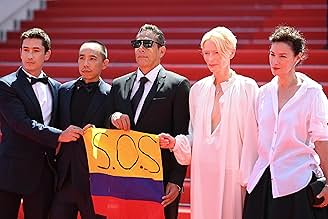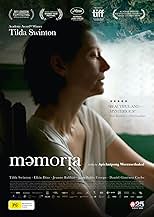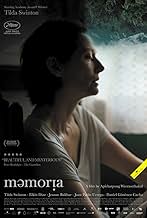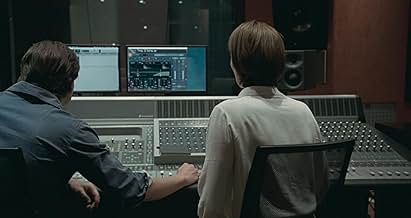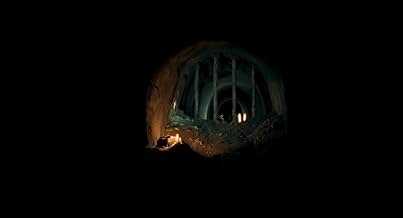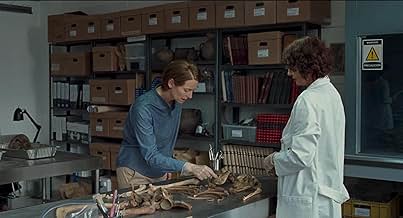VALUTAZIONE IMDb
6,4/10
12.227
LA TUA VALUTAZIONE
Una donna scozzese, durante un viaggio in Colombia, inizia a notare strani suoni. Presto inizia a pensare al loro aspetto.Una donna scozzese, durante un viaggio in Colombia, inizia a notare strani suoni. Presto inizia a pensare al loro aspetto.Una donna scozzese, durante un viaggio in Colombia, inizia a notare strani suoni. Presto inizia a pensare al loro aspetto.
- Regia
- Sceneggiatura
- Star
- Premi
- 10 vittorie e 27 candidature totali
Daniel Toro
- Anthropologist Assistant
- (non citato nei titoli originali)
Recensioni in evidenza
*Watched at Cannes 2021 World Premiere*
The work of Thai director Apichatpong Weerasethakul (try saying that five times fast) have never fully been able to register with audiences outside of the festival circuit. He has amassed universal critical acclaim since he graced the Cannes Riviera in 2004 with "Tropical Malady." He creates gaps between his feature films by creating several short films, some of which eventually are spawned into feature-length, such as the 2009 short "A Letter to Uncle Boonmee" becoming the 2010 Palme d'Or winning "Uncle Boonmee Who Can Recall His Past Lives." Now in 2021, Weerasethakul is stepping outside of his native Thailand for "Memoria," (translated from the Latin word "memory") which prompted another return to Cannes, this time netting him the Jury Prize.
The first English-language film for Weerasethakul, "Memoria'' is set within Colombia, following Tilda Swinton from destination to destination. The film opens with a surprising jumpscare illustrating our main character's problem, which is that she often hears a loud crashing noise that seems to be confined entirely within her head. This noise confounds her, leading to an investigation into what exactly it is and why it is happening, which puts her in contact with a sound engineering student, a morgue doctor, and a strange fisherman offering profound insights on memory and identity.
Those familiar with the work of Weerasethakul will know that the plot is not the driving force behind the ultimate narrative. Instead, the visuals and sound work do the bulk of the heavy lifting. Within "Memoria," dialogue is seldom found for long stretches at a time, leaving the viewer to look at the screen like one would look at a painting, soaking in as much information as possible. This restriction of information will irritate those looking for answers to the questions the film raises, which Weerasethakul doesn't have any intention of addressing. The Cannes World Premiere garnered nearly fifty walkouts from disgruntled viewers, and several nodding heads from the slow pacing that were often reawakened by the mysterious crashing noise, which shook the theatre.
Swinton acts less like a character and more like a wandering observer. Never shot in closeup and always present of the world around her, she moves from place to place, learning new information about her condition, all without much dialogue from her end. The first half of the film is where Swinton does most of her traveling, which keeps the film moving at a steady, yet still slow, pace. Much of the "action" within these journeys would be considered filler in most mainstream projects, such as Swinton waiting patiently for the sound engineer to finish his work before addressing her, or an unbroken take consisting solely of car alarms going off.
The last hour of the film is where some will applaud and others will boo (just as they did at the world premiere). Swinton's final journey takes her to a remote village housing a fisherman who claims to remember everything about his life. The two of them engage in an extended conversation that explores the strange connection they share. To an extent, the conversation acts as a vessel for Weerasethakul to talk to his audience about his ideas about cinema and life. It's a bold move by a director not known for boldness, and is one that teeters reshapes the way you look at the world at its best and teeters on self-aggrandizing at its worst. Weerasethakul ties his thesis up in a perfect bow with an ultimate answer that is fittingly incomprehensible and produces several more questions.
"Memoria" is a work for the cinephiles that need an escape from the noise of the modern world. It's wildly beautiful and imaginative, all while challenging your patience and viewpoints. Go in with an open mind, and you find yourself enlightened.
The work of Thai director Apichatpong Weerasethakul (try saying that five times fast) have never fully been able to register with audiences outside of the festival circuit. He has amassed universal critical acclaim since he graced the Cannes Riviera in 2004 with "Tropical Malady." He creates gaps between his feature films by creating several short films, some of which eventually are spawned into feature-length, such as the 2009 short "A Letter to Uncle Boonmee" becoming the 2010 Palme d'Or winning "Uncle Boonmee Who Can Recall His Past Lives." Now in 2021, Weerasethakul is stepping outside of his native Thailand for "Memoria," (translated from the Latin word "memory") which prompted another return to Cannes, this time netting him the Jury Prize.
The first English-language film for Weerasethakul, "Memoria'' is set within Colombia, following Tilda Swinton from destination to destination. The film opens with a surprising jumpscare illustrating our main character's problem, which is that she often hears a loud crashing noise that seems to be confined entirely within her head. This noise confounds her, leading to an investigation into what exactly it is and why it is happening, which puts her in contact with a sound engineering student, a morgue doctor, and a strange fisherman offering profound insights on memory and identity.
Those familiar with the work of Weerasethakul will know that the plot is not the driving force behind the ultimate narrative. Instead, the visuals and sound work do the bulk of the heavy lifting. Within "Memoria," dialogue is seldom found for long stretches at a time, leaving the viewer to look at the screen like one would look at a painting, soaking in as much information as possible. This restriction of information will irritate those looking for answers to the questions the film raises, which Weerasethakul doesn't have any intention of addressing. The Cannes World Premiere garnered nearly fifty walkouts from disgruntled viewers, and several nodding heads from the slow pacing that were often reawakened by the mysterious crashing noise, which shook the theatre.
Swinton acts less like a character and more like a wandering observer. Never shot in closeup and always present of the world around her, she moves from place to place, learning new information about her condition, all without much dialogue from her end. The first half of the film is where Swinton does most of her traveling, which keeps the film moving at a steady, yet still slow, pace. Much of the "action" within these journeys would be considered filler in most mainstream projects, such as Swinton waiting patiently for the sound engineer to finish his work before addressing her, or an unbroken take consisting solely of car alarms going off.
The last hour of the film is where some will applaud and others will boo (just as they did at the world premiere). Swinton's final journey takes her to a remote village housing a fisherman who claims to remember everything about his life. The two of them engage in an extended conversation that explores the strange connection they share. To an extent, the conversation acts as a vessel for Weerasethakul to talk to his audience about his ideas about cinema and life. It's a bold move by a director not known for boldness, and is one that teeters reshapes the way you look at the world at its best and teeters on self-aggrandizing at its worst. Weerasethakul ties his thesis up in a perfect bow with an ultimate answer that is fittingly incomprehensible and produces several more questions.
"Memoria" is a work for the cinephiles that need an escape from the noise of the modern world. It's wildly beautiful and imaginative, all while challenging your patience and viewpoints. Go in with an open mind, and you find yourself enlightened.
"Enjoy the silence" a title card states as Apichatpong Weerasethakul invites the viewer to experience MEMORIA; And, an experience it truly is as Weerasethakul's metaphysical film infuses the viewer with natural sights and sounds. That opening acts almost as an overture, as the Director's personal sketches are superimposed over still photographs from the production of the film - all 'scored' to absolute silence.
MEMORIA's protagonist is Jessica (Tilda Swinton) who awakes one morning to a mysterious sonic bang. Jessica is a botanist living in Columbia who is visiting her sister in Bogota. The bang continues to haunt Jessica as she goes about her daily life. Slowly, she feels that her mind is slipping - is she imaging the sounds? People she believes she has met don't seem to exist. On a drive back to her home in Medellin, she meets (or does she?) a man named Hernan (Elkin Diaz) and they spend a long afternoon together.
Weerasethakul's film doesn't have a formal plot. Swinton is so attuned to her filmmaker's methods that she inhabits rather than acts. The Director's method is to utilize only the most minimal of editing with extended takes. Cinematographer Sayombhu Mukdeeprom exquisitely captures the crucial mood and beauty of the natural world on 35mm film. The sonic bangs seem ever more loud because the sound design accentuates an organic soundscape; even the human voices are seemingly mixed below normal levels.
"Sometimes there's no escape except in dreams" reads another title card after the 'overture'. The classical definition of "Memoria" can be very loosely translated as "Memory", but its true meaning is much deeper. It describes a way in which the human mind stores and utilizes those thoughts and senses. The sonic bangs can be seen as a way of triggering Jessica's states of consciousness. Her own Memoria.
MEMORIA isn't a film for general audiences. Indeed, it's release is a never-ending world tour with the Producers claiming it shall never be sold for home viewing - streaming or physical media. It's very much a communal experience in a theater. The aural and visual tour de force to be savored not only by the individual -- but, by the audience in toto.
MEMORIA's protagonist is Jessica (Tilda Swinton) who awakes one morning to a mysterious sonic bang. Jessica is a botanist living in Columbia who is visiting her sister in Bogota. The bang continues to haunt Jessica as she goes about her daily life. Slowly, she feels that her mind is slipping - is she imaging the sounds? People she believes she has met don't seem to exist. On a drive back to her home in Medellin, she meets (or does she?) a man named Hernan (Elkin Diaz) and they spend a long afternoon together.
Weerasethakul's film doesn't have a formal plot. Swinton is so attuned to her filmmaker's methods that she inhabits rather than acts. The Director's method is to utilize only the most minimal of editing with extended takes. Cinematographer Sayombhu Mukdeeprom exquisitely captures the crucial mood and beauty of the natural world on 35mm film. The sonic bangs seem ever more loud because the sound design accentuates an organic soundscape; even the human voices are seemingly mixed below normal levels.
"Sometimes there's no escape except in dreams" reads another title card after the 'overture'. The classical definition of "Memoria" can be very loosely translated as "Memory", but its true meaning is much deeper. It describes a way in which the human mind stores and utilizes those thoughts and senses. The sonic bangs can be seen as a way of triggering Jessica's states of consciousness. Her own Memoria.
MEMORIA isn't a film for general audiences. Indeed, it's release is a never-ending world tour with the Producers claiming it shall never be sold for home viewing - streaming or physical media. It's very much a communal experience in a theater. The aural and visual tour de force to be savored not only by the individual -- but, by the audience in toto.
I like slow-burning films; the idea of being given enough time to really live in the movie you are watching really appeals to me, often more so than faster-paced, spectacular projects. I also like arthouse films; the atmosphere and characters can often be just as engaging, if not more, than a traditionally linear storyline. Thing is, you need to have at least the semblance of a storyline in a film, otherwise, it's like buying a loaf of bread and finding no bread in it!
Memoria is deliberately pitched at a snail's pace. There isn't a storyline as such, but rather a series of events, some of which we return to. Clearly, Apichatpong Weerasethakul, who writes and directs, has a vision for this - together, one would presume, with his cast and crew. For the most part, it leaves me cold, and I find myself trying to imagine how Weerasethakul initially tried to communicate what he is trying to achieve here to his actors. I actually felt the makers were taking the mickey, daring me to stick with this when they have no intention of providing much reason to, or indeed any kind of pay-off.
Some will undoubtedly tell me I don't 'get' it, and that's almost certainly true, but I can't honestly see that there is anything *to* get, because with the suspension of disbelief fully installed, all I see here is a group of blandly inoffensive people doing very little except having whispered conversations and being desperately polite to each other in front of an unmoving camera. There were times when I had to wait for someone to blink to convince myself the BluRay hadn't frozen. This left me cold, I'm afraid. My score is 3 out of 10 for some nicely filmed locations.
Memoria is deliberately pitched at a snail's pace. There isn't a storyline as such, but rather a series of events, some of which we return to. Clearly, Apichatpong Weerasethakul, who writes and directs, has a vision for this - together, one would presume, with his cast and crew. For the most part, it leaves me cold, and I find myself trying to imagine how Weerasethakul initially tried to communicate what he is trying to achieve here to his actors. I actually felt the makers were taking the mickey, daring me to stick with this when they have no intention of providing much reason to, or indeed any kind of pay-off.
Some will undoubtedly tell me I don't 'get' it, and that's almost certainly true, but I can't honestly see that there is anything *to* get, because with the suspension of disbelief fully installed, all I see here is a group of blandly inoffensive people doing very little except having whispered conversations and being desperately polite to each other in front of an unmoving camera. There were times when I had to wait for someone to blink to convince myself the BluRay hadn't frozen. This left me cold, I'm afraid. My score is 3 out of 10 for some nicely filmed locations.
This movie is only for the eyes of a few people. To those eyes, it offers many answers, inspiration, and a lot of insight - to the latter it will look like total rubbish. I understand and respect this. However, this movie was fascinating for me. It requires a great amount of patience and total attention - and a base knowledge of buddhism helps a lot with many symbols scattered around the movie. It is something that needs you to focus with an open mind - because it has nothing to do with a story, a plot, it rather gives you the chance to observe a very subtle reality often ignored. Not with a storyline, but a chain of circumstances which may look meaningless or unimportant if you don't look close enough. Sounds were used brilliantly, and the whole movie made me feel there was nothing decorative, all scenes, and little things, and pauses were there only because they were absolutely necessary to deliver the message. It was more like a meditation. This one provided me so many unexpected answers and spiritual inspiration, and I'm sure I'll be thinking about it and 'feeling' it for a while.
This is going to be very difficult for some to watch. Tilda is fantastic, the way she connected with the story telling for the concept of memories, is what helps this movie. Good visuals, eerie atmosphere, sometimes you get lost a bit, but then you find what is all going. This movie is released for those who need to actually watch these types of cinema, not for the average movie fan.
Lo sapevi?
- QuizIn an unconventional move, art-house film distributor Neon is releasing Memoria in the USA "from city to city, theater to theater, week by week, playing in front of only one solitary audience at any given time." And furthermore, according to IndieWire (10/5/21) the film will only play in theaters and it will not become available on DVD, on demand, or on streaming platforms. They later abandoned this release strategy though after touring through only New York and Chicago and the film was eventually released in many cities simultaneously across North America in April, 2022.
- Citazioni
Older Hernán Bedoya: I remember everything, so I limit what I see.
- ConnessioniReferenced in Radio Dolin: Stream with Anton Dolin (2021)
- Colonne sonoreMemoria
Written by César López
Piano performed by César López
Cello performed by Sandra Parra
Recorded by Julio Monroy
Recorded in Bogotá, Columbia by Burning
(C) 2020 Burning
I più visti
Accedi per valutare e creare un elenco di titoli salvati per ottenere consigli personalizzati
- How long is Memoria?Powered by Alexa
Dettagli
Botteghino
- Lordo Stati Uniti e Canada
- 52.656 USD
- Fine settimana di apertura Stati Uniti e Canada
- 6797 USD
- 26 dic 2021
- Lordo in tutto il mondo
- 588.713 USD
- Tempo di esecuzione2 ore 16 minuti
- Colore
- Mix di suoni
- Proporzioni
- 1.85 : 1
Contribuisci a questa pagina
Suggerisci una modifica o aggiungi i contenuti mancanti




